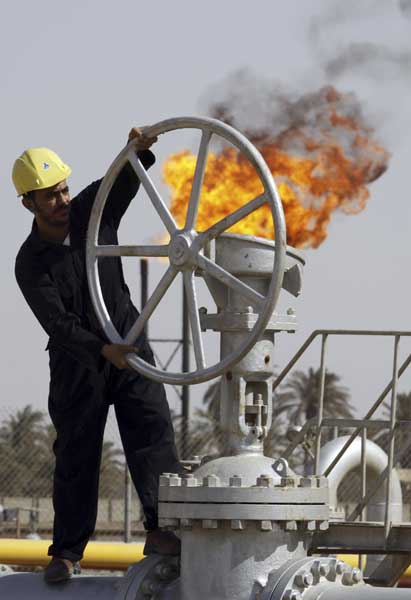East Winds, West Winds, By Mahdi Issa Al-Saqr, trans. Paul Starkey

Mahdi Issa Al-Saqr, one of Iraq's most pioneering and prominent authors in the second half of the 20th century, was a prolific writer who published six collections of stories, five novels and a memoir between 1954 and his death in 2006. East Winds, West Winds, published in Cairo in 1998, is a strongly autobiographical novel about an aspiring writer working as a translator for a British company in the oil fields near Basra during the 1950s.
Mohammed is shy and bookish, surviving the sometimes brutal, often surreal, conditions in the Iraqi workers' camp by reading and by recording the world around him in notes towards a novel. His perspective soars high and looks at his surroundings from a great distance. "You have to imagine a bird flying high in the sky over this small patch of land, seeing underneath it two worlds crossed by the public road leading to Basra, like a long black wall... On one side, next to the desert, lives a group of workmen, while the managers' quarters nestles on the other side, between the palm groves near the banks of the Shatt al-Arab".
He also observes "with total concentration, as if (he) were venerating" this world. He recalls every small detail: the bark of a dog, an empty arrack bottle under a bed, grass growing out of a crack in the wall. Mr Fox, his manager, formerly a policeman in Palestine, is a petty sadist who rules the workforce through surveillance and paranoia. His roommates include the wily, fat informant Abu Jabbar, Hussein the unionist, and Istifan, who dies in a tragic and unnecessary accident.
The first "face" of the novel sees through Mohammed's eyes, but is often written in the second person, as though the author is speaking between past and present, to remembered and fictionalised selves. His vision of the workers' camp is claustrophobic, often squalid, and sometimes tragic; and culminates in an unsuccessful strike. Personal animosities have political consequences.
The second "face" of the novel is set in the more glamorous managers' compound, with its pretty gardens, tennis courts, pool and club. Here the British managers - and a handful of young Iraqi managers and their wives - drink, gossip and conduct extramarital affairs. The focus of this half is Husam, a fair young Iraqi engineer, who has recently returned from his studies in Britain, and his affair with Maureen Sullivan, the neglected wife of a colleague.
While Husam is a well-intentioned, if self-absorbed, young man, more concerned about love than politics, he is drawn into the hierarchies and webs of power at play. The deceptions and resentments of others have serious consequences for both Husam and Mohammed. Paul Starkey's elegant and lucid translation does justice to Al-Saqr's absorbing and subtle portrait of British colonialism in action. It shows the muted aspirations of the post-war generation of educated Iraqis with emotional and sociological acuity.
Join our commenting forum
Join thought-provoking conversations, follow other Independent readers and see their replies
Comments
Bookmark popover
Removed from bookmarks